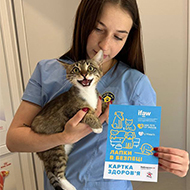Charities vaccinate pets as rabies spreads in Ukraine

There were more than a thousand rabies cases in Ukraine last year.
A coalition of animal welfare organisations are vaccinating pets in Ukraine against rabies as outbreaks in the country increase.
More than 1,500 animals have been vaccinated as part of the Save Paws project, out of a planned total of 7,000.
The number of rabies cases in Ukraine has grown since Russia launched its full-scale invasion of the country. The causes include a 60 per cent increase in the number of stray animals and the ongoing fighting making it harder to implement rabies prevention measures.
In 2023, 1,222 cases of animals with rabies were recorded in Ukraine, 2.3 times the amount seen in 2022. The highest number of cases have been in the Dnipropetrovsk, Lviv, Kharkiv, Ternopil, and Vinnytsia regions.
As part of the Save Paws project, animals are also being vaccinated against other infectious diseases and microchipped. Priority is being given to the pets of internally displaced Ukrainians.
The scheme, which was launched in May 2024, is a collaboration between the International Fund for Animal Welfare, Save Pets of Ukraine, and U-Hearts.
The Ukrainian government is also working to reduce the spread of rabies and improve pet identification. It has launched the Unified State Register of Pets, a nationwide database which will allow for real-time monitoring of vaccinations and help reunite lost pets with their owners.
Anastasia Ivanychenko, project co-ordinator at Save Pets of Ukraine, said: “Preventing the spread of infectious diseases is a complex and important task for us. The rabies problem in Ukraine only seems irrelevant. Increasingly, veterinarians and pet owners from east to west are encountering it.”
Image © U-Hearts



 The Veterinary Medicines Directorate (VMD) is inviting applications from veterinary students to attend a one-week extramural studies (EMS) placement in July 2026.
The Veterinary Medicines Directorate (VMD) is inviting applications from veterinary students to attend a one-week extramural studies (EMS) placement in July 2026.